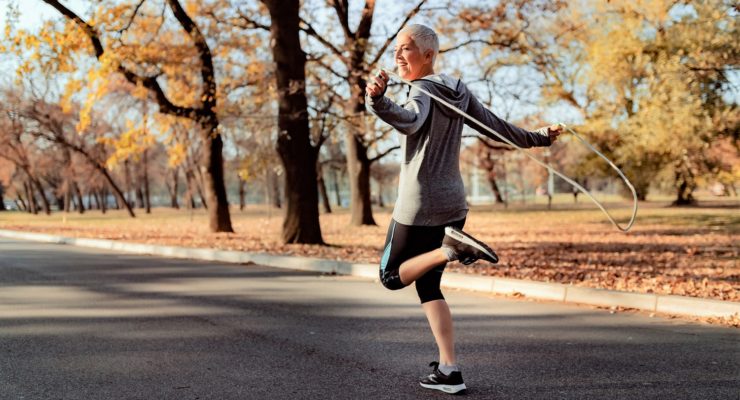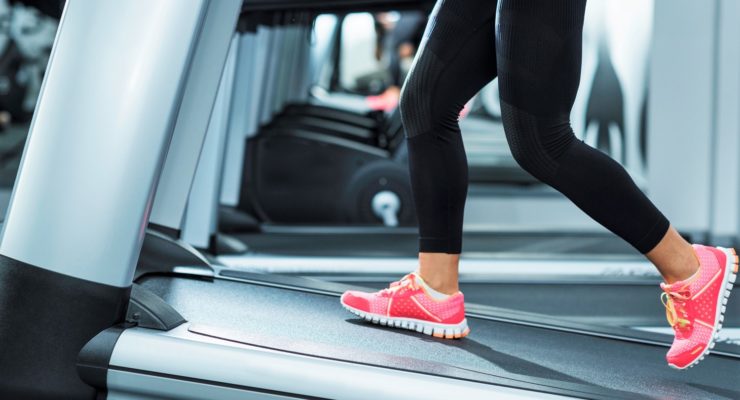Overwhelming evidence from numerous studies supports the importance of strength training. It can help you slim down and even support overall better health, including healthy aging. A study funded by the National Institutes of Health found that resistance training may have more impact on bone density than aerobic exercise—which his important to avoid frailty in older age.1
But for a lot of people, adding strength training to your at-home fitness routine can be intimidating. If you fall into that category, you might be feeling like you don’t even know where to begin.
Fortunately, it doesn’t have to be complicated and you can see great success with minimal equipment for your home workouts. Dumbbell (also called “free weight”) exercises are a great place to start for full body exercises. If you’re a true beginner, use light weight to prevent injury or strain and work your way up to more poundage. As you get started with a dumbbell routine, here are five exercises to try.
1. Bicep Curl with Dumbbells

A bicep curl is a weight training exercise that will build strength in your bicep muscles (located at the front of your upper arms). This can be performed seated on a bench or standing. Simply grasp a dumbbell in each hand while letting your arms hang to the sides. Then bring the dumbbells up toward your chest and return them slowly back down to your sides.2
According to the American Council on Exercise (ACE), your breathing is of critical importance during a workout.3 You should exhale as you bring the dumbbells into your chest and inhale as you return them to your starting position.2 Proper breathing during strength training ensures your body receives the oxygen it requires.
2. Dumbbell Chest Press

The chest press is a classic weight training move and is easy to do with dumbbells. This exercise works your pectorals (chest), deltoids (shoulders) and triceps (arms)—so it’s a triple threat! Start by holding a weight in each hand and slowly lying back on a yoga mat on the floor—or on a bench if you have one. According to ACE, this is a good move to do with a spotter.4
Hold a dumbbell in each hand with your palms facing forward. With a firm grip on the dumbbells, fully extend your arms, keeping the dumbbells level with or just under your eyes. ACE says to maintain a “neutral wrist position” throughout the exercise. Transition to the downward phase by inhaling and slowly lowering the dumbbells towards your armpits. Lightly touch the dumbbells on your chest: make sure not to bounce the dumbbells on your chest and try not to arch your lower back. Exhale and repeat the upward phase by pushing the dumbbells up until your arms are fully extended again.4
ACE also suggests a dumbbell alternating arm chest press as a variation. In this version, you’ll just do one dumbbell at a time.5
3. Lunging with Dumbbells

Did you know that you can use dumbbells to improve your leg training workouts, too? Leg lunges are a popular workout that you may already be familiar with. As you step forward into a lunge position, you strengthen your leg muscles. By adding some weight to your lunges, you create additional work for your upper leg muscles and the muscles of your buttocks.6 It’s an easy way to get more out of this workout move.
For a variation to a traditional lunge, ACE suggests trying walking lunges with external rotation. You’ll step forward into lunge position, hold a single dumbbell in both hands and extend your arms in front of you—then rotate to the right. Rotate back to center, pull the dumbbell into your chest, and return to standing.5
4. Squatting with Dumbbells

In addition to lunges, you can also incorporate your dumbbell weights into your squat exercises. With weights, your body will burn more calories and you’ll achieve toned muscles more quickly.
With your feet a little wider than your hips, hold a weight in each hand with your palms facing in. Move the dumbbells so they are in front of your shoulders. Lower down into squat position. According to ACE, you should shift your hips backwards and then down “to create a hinge-like movement at your knees.” Try not to let your knees and shinbone go to far forward. As you continue to get lower, your thighs should be parallel or almost parallel to the floor. Your knees should also be directly over your second toe, says ACE. Slowly rise back to the beginning position.7
5. Planking with Dumbbells

We’ve tried to have a little bit of everything in this dumbbell workout, so of course we need a core exercise in here, too. Dumbbells can also be incorporated into your plank routine, but it should be noted that this is a step up from planking alone. That means if you haven’t already been doing planks, you should definitely start without weights and build some core strength before making it more challenging.
If you’ve already been planking, you can enhance that plank by turning it into a “Dumbbell Renegade Row” and adding those free weights. You’ll really boost the fitness factor of this workout. This is a more advanced exercise, so you should work up to this one gradually.
Plank with your hands gripping your dumbbells. According to ACE, your hands should be under your shoulders. They explain that you should start the move with the elbows bent and chest aligned with the dumbbells. Push up into a plank and straighten the arms, then lift one dumbbell to the chest, keeping your elbows in. Your body should stay flat throughout the exercise. Place the weight down to complete the row, then lower down and repeat on the other side.8
Adding to Your Full Body Dumbbell Routine

Hopefully, these five easy dumbbell exercises gave you some ideas to start building strength training into your routine. There are many more dumbbell exercise ideas out there and a quick online search will reveal many other ideas so that you can keep your at home workout varied and interesting. Just be sure that you’re turning to reputable sources like ACE when discovering new exercises.
You always have to be careful that you’re easing into weight workouts and performing them properly so that you don’t get hurt. Performing a dumbbell exercise incorrectly may not only mean you don’t gain the benefits, but it could also lead to an injury. Always start with smaller poundage and work your way up. Soon, you’ll be on your way to being stronger and healthier.
*Always speak with your doctor before starting an exercise routine.
Sources:
- https://www.ncbi.nlm.nih.gov/pmc/articles/PMC5552187/
- https://www.acefitness.org/education-and-resources/lifestyle/exercise-library/44/seated-biceps-curl/
- https://www.acefitness.org/certifiednewsarticle/633/want-to-improve-your-performance-breathe/
- https://www.acefitness.org/education-and-resources/lifestyle/exercise-library/19/chest-press/
- https://www.acefitness.org/education-and-resources/lifestyle/blog/3600/workout-wednesday-15-minute-dumbbell-workout/
- https://www.acefitness.org/education-and-resources/lifestyle/exercise-library/363/lunge/
- https://www.acefitness.org/education-and-resources/lifestyle/exercise-library/22/front-squat/
- https://www.acefitness.org/education-and-resources/lifestyle/exercise-library/355/renegade-row/
The post 5 At Home Full Body Dumbbell Exercises for Your At-Home Fitness Routine appeared first on The Leaf.
from The Leaf https://leaf.nutrisystem.com/best-at-home-full-body-dumbbell-workout-for-your-exercise-routine/




Post a Comment